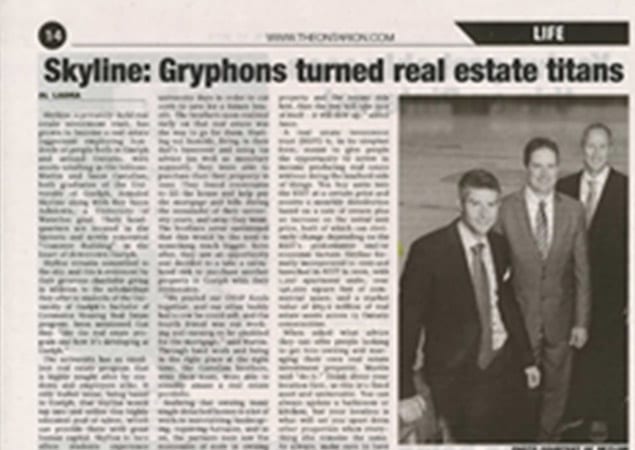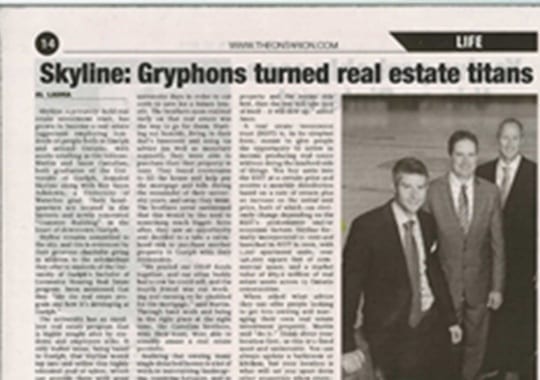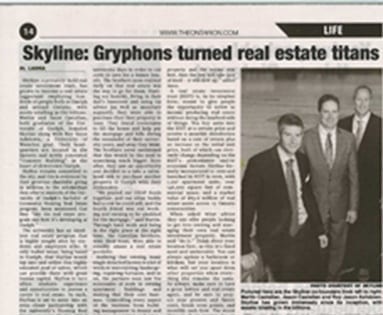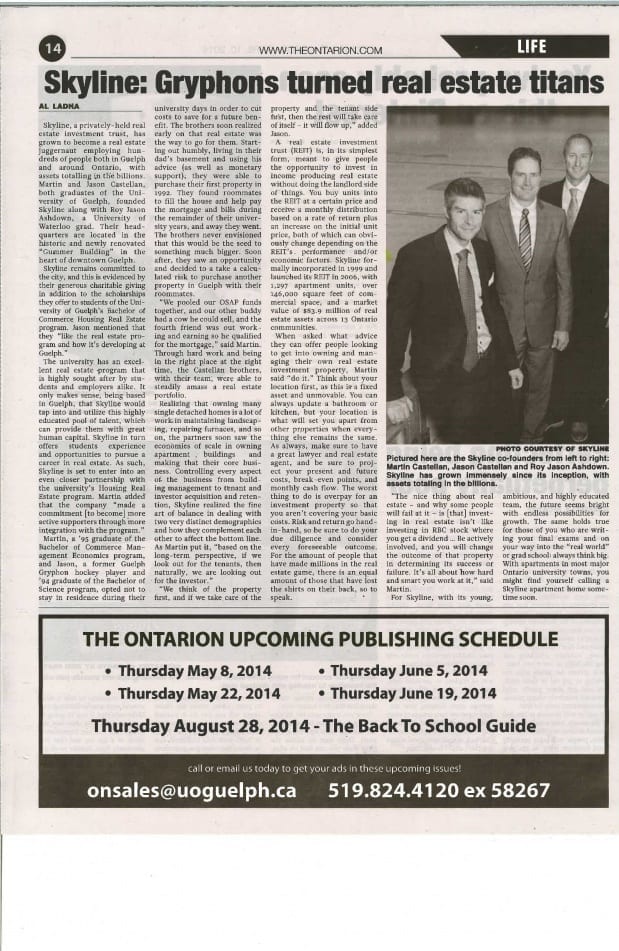


Skyline Featured in University of Guelph’s Ontarion
Gryphons turned real estate titans...
Skyline, a privately-held real estate investment trust, has grown to become a real estate juggernaut employing hundreds of people both in Guelph and around Ontario, with assets totalling in the billions. Martin and Jason Castellan, both graduates of the University of Guelph, founded Skyline along with Roy Jason Ashdown, a University of Waterloo grad. Their headquarters are located in the historic and newly renovated “Gummer Building” in the heart of downtown Guelph.
Skyline remains committed to the city, and this is evidenced by their generous charitable giving in addition to the scholarships they offer to students of the University of Guelph’s Bachelor of Commerce Housing Real Estate program. Jason mentioned that they “like the real estate program and how it’s developing at Guelph.”
The university has an excellent real estate program that is highly sought after by students and employers alike. It only makes sense, being based in Guelph, that Skyline would tap into and utilize this highly educated pool of talent, which can provide them with great human capital. Skyline in turn offers students experience and opportunities to pursue a career in real estate. As such, Skyline is set to enter into an even closer partnership with the university’s Housing Real Estate program. Martin added that the company “made a commitment [to become] more active supporters through more integration with the program.”
Martin, a ’95 graduate of the Bachelor of Commerce Management Economics program, and Jason, a former Guelph Gryphon hockey player and ’94 graduate of the Bachelor of Science program, opted not to stay in residence during their university days in order to cut costs to save for a future benefit. The brothers soon realized early on that real estate was the way to go for them. Starting out humbly, living in their dad’s basement and using his advice (as well as monetary support), they were able to purchase their first property in 1992. They found roommates to fill the house and help pay the mortgage and bills during the remainder of their university years, and away they went. The brothers never envisioned that this would be the seed to something much bigger. Soon after, they saw an opportunity and decided to a take a calculated risk to purchase another property in Guelph with their roommates.
“We pooled our OSAP funds together, and our other buddy had a cow he could sell, and the fourth friend was out working and earning so he qualified for the mortgage,” said Martin. Through hard work and being in the right place at the right time, the Castellan brothers, with their team, were able to steadily amass a real estate portfolio.
Realizing that owning many single detached homes is a lot of work in maintaining landscaping, repairing furnaces, and so on, the partners soon saw the economies of scale in owning apartment buildings and making that their core business. Controlling every aspect of the business from building management to tenant and investor acquisition and retention, Skyline realized the fine art of balance in dealing with two very distinct demographics and how they complement each other to affect the bottom line. As Martin put it, “based on the long-term perspective, if we look out for the tenants, then naturally, we are looking out for the investor.”
“We think of the property first, and if we take care of the property and the tenant side first, then the rest will take care of itself – it will flow up,” added Jason.
A real estate investment trust (REIT) is, in its simplest form, meant to give people the opportunity to invest in income producing real estate without doing the landlord side of things. You buy units into the REIT at a certain price and receive a monthly distribution based on a rate of return plus an increase on the initial unit price, both of which can obviously change depending on the REIT’s performance and/or economic factors. Skyline formally incorporated in 1999 and launched its REIT in 2006, with 1,297 apartment units, over 146,000 square feet of commercial space, and a market value of $83.9 million of real estate assets across 13 Ontario communities.
When asked what advice they can offer people looking to get into owning and managing their own real estate investment property, Martin said “do it.” Think about your location first, as this is a fixed asset and unmovable. You can always update a bathroom or kitchen, but your location is what will set you apart from other properties when everything else remains the same. As always, make sure to have a great lawyer and real estate agent, and be sure to project your present and future costs, break-even points, and monthly cash flow. The worst thing to do is overpay for an investment property so that you aren’t covering your basic costs. Risk and return go hand-in-hand, so be sure to do your due diligence and consider every foreseeable outcome. For the amount of people that have made millions in the real estate game, there is an equal amount of those that have lost the shirts on their back, so to speak.
“The nice thing about real estate – and why some people will fail at it – is [that] investing in real estate isn’t like investing in RBC stock where you get a dividend … Be actively involved, and you will change the outcome of that property in determining its success or failure. It’s all about how hard and smart you work at it,” said Martin.
For Skyline, with its young, ambitious, and highly educated team, the future seems bright with endless possibilities for growth. The same holds true for those of you who are writing your final exams and on your way into the “real world” or grad school: always think big. With apartments in most major Ontario university towns, you might find yourself calling a Skyline apartment home sometime soon.
Click here to read an online version of the, “Skyline: Gryphons turned real estate titans” article.
